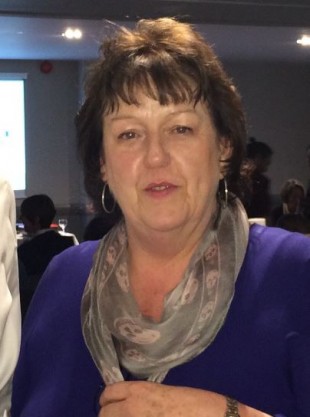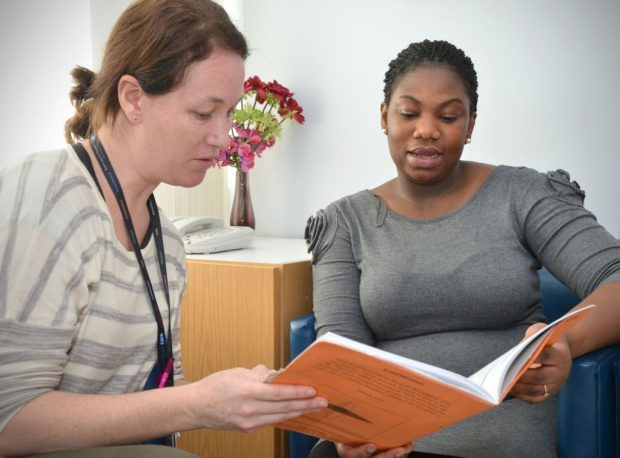
Antenatal & Newborn Screening Specialist Midwife
Western Sussex Hospitals NHS Foundation Trust
It takes a large army of staff to make screening programmes work well. Today, we start a series of blog articles highlighting some of their roles. Pat Schan talks about her job as antenatal and newborn screening coordinator at Western Sussex Hospitals Foundation Trust.
A decade ago I was a community midwife and fairly fed up with on-calls and negotiating hideous traffic.
A good friend had moved to Worthing Hospital a year or two earlier and told me there was a vacancy for a screening co-ordinator. “Not for me,” I said. “Don’t fancy that.” Then she told me there were regular hours, a staff car park and my own office. “I’m your woman,” I replied.
The interview was tough but I got the job. In those days, women attended antenatal screening clinics on a Tuesday morning to have a triple test – and then phoned in for their results on a Thursday. The scanning department would occasionally phone to say they had a lady with a problem and were sending her straight up. As a result, I spent a lot of time scrabbling through scan abnormality reference books.
Today, following the 2010 merger with St Richard’s Hospital in Chichester, we are Western Sussex Hospitals Foundation Trust. We were rated Outstanding by the Care Quality Commission and deal with around 5,500 births each year.
I coordinate all 6 antenatal and newborn screening programmes for the trust and manage a small team across both sites. I am well supported by the head of midwifery and line managed by a passionate senior midwifery manager in public health, who is totally committed to screening.
I work 4 long days per week and a typical day (if there is such a thing) starts at about 7:15 am.

First I check the handover sheet of our current cases before having the first of my 10 daily cups of tea. Then I catch up with the antenatal clinic team leader, who I share an office with, and check if any of our caseload women are inpatients.
We deal with a range of issues including:
- follow-up plans for babies born to women who have positive infectious diseases screening results – mainly HIV and hepatitis
- babies with known or undiagnosed anomalies
- babies with suspected chromosome abnormalities
- counselling women and couples about high risk screening results
Women often ask: “What would you do?” But it is important that we are not directive and don’t make assumptions. Our role is to provide information and choices.
I am based at Worthing Hospital but go to our other hospital at least once a week. We have regular team meetings and a great relationship with our tertiary centres, especially St George’s in London. I was lucky enough to be part of the national forum that looked at the new standards for infectious diseases in pregnancy screening and the antenatal rubella screening cessation group, which was a really interesting experience. We also ran 2 screening study days during 2015 to 2016 which were great fun – including demonstrating recessive inheritance by doing speed dating to disco music!
Having been one of the first trusts to have a quality assurance visit, I trained as a peer reviewer and have taken part in 2 visits this year. I love seeing how other antenatal screening coordinators run their services and have picked up some good tips along the way.
My advice for screening coordinator colleagues would be to ensure:
- your guidelines are consistent with national standards
- you can show evidence of attendance at screening board meetings
- you can show evidence of how you escalate issues and risk through the trust's governance structure
And, of course, I'd advise them to keep up to date with screening developments by signing up to receive the PHE Screening blog posts. They are such a good way to get information over, share good practice and give screening the high profile it deserves.
Working in screening is tough. It can be isolating and we all have days of giving bad news but there is huge job satisfaction in helping parents through really challenging times.
I am so glad my friend told me about this job all those years ago.
PHE Screening blogs
PHE Screening blogs provide up to date news from all NHS screening programmes – replacing our previously published newsletters.
You can register to receive updates direct to your inbox, so there’s no need to keep checking for new blogs.
7 comments
Comment by Janice barber posted on
Well written Pat...you are a dedicated screening team leader and an amazing role model to all us deputies! ? Xx
Comment by Chee posted on
I had the honour to work with Pat and her team. They are dedicated to make sure patients are well looked after!
Comment by Heather Johnson posted on
Thank you Pat for giving us an in sight into the working life of a screening coordinator, I'm really pleased that you have clearly stated that you coordinate 6 programmes, as very often it is assumed that "screening" just covers scans and foetal abnormalities.
Comment by Pat Schan posted on
Thank you for your kind comments - I am very aware that the amazing support and commitment to screening from my manager and HOM makes it so much easier.
At WSHFT ANNB Screening is seen as a vital Public Health element and I think the strong PH team and profile we have in the trust is key .
Comment by Kay Francis posted on
Such an inspiration to those of us who are struggling to get support on a day to day basis. Well done and well deserved.
Comment by Margaret Quraishi Screening Midwife posted on
Inspirational Pat shall be asking my new colleagues to the antenatal and neonatal screening team at our Trust to read your synopsis of your role and ensure they sign up to the BLOG
Comment by Sharon Webb posted on
Excellent synopsis, congratulations to Pat